Matakara Places So Much Faith In Arajin Based On Who He Was Like Over 5 Years Ago That Bro Still Somehow
matakara places so much faith in arajin based on who he was like over 5 years ago that bro still somehow doesn't give up on him even after arajin straight up says they're not friends while he's still in the same room 😭😭😭
More Posts from Certifiedlesbianvampire and Others


if you listen closely you can hear the shippers screaming
(its me, im the shippers)
Cooking, love and home(1.5)
I shared an updated version of this analysis in a Twitter thread. I had my doubts about doing it here too, but I want to avoid misunderstandings, and I also notice that new people are slowly joining in, so maybe it's not such a bad idea. Also, I feel indebted to this community
This new version is focused on Arajin and Matakara, to adding a couple of extra things(It's not exactly the same as the previous one), after all, Bucchigiri had not yet finished when I shared the first analysis. If you prefer the previous version, don't worry, it's still there
Many surely know that cooking and everything that it implies along with food and sharing the table is a whole language that lends itself to multiple interpretations, and I was pleasantly surprised to see that Bucchigiri knows how to speak it unexpectedly well.
One of the things that cooking is usually associated with is maturity and independence, since we are talking about a skill that is considered important for adult life.
Curiously, this is something that we can notice a little in Arajin, who, although he's still someone with questionable behavior, also has the responsibility of helping his mother with the restaurant, which he fulfills diligently, being one of the few occasions in which we can see the character in a more positive light, showing us in a subtle way that there are redeemable things in him
It's also important to mention that his ability to cook is something that his mother has taught him, showing her love through her guidance, it may not seem like a big deal, but we will see that it says more than it seems.
This is a complete contrast to Matakara, who despite living with his relatives, seems to have had no such support, It could be argued that he had his brother, but let's remember that the age gap between the two is not too much, so it's normal that despite his efforts, Mitsukini didn't have enough tools to properly guide his younger brother.

Knowing this, we can talk about the scene in which both friends cook together, since it is where we can really appreciate this contrast more, represented by the gyoza, seeing how Arajin makes them with ease and skill, while Matakara fails every attempt, showing us how there is a gap between the two, not only in their friendship, but also in the availability of tools to be able to move forward with their lives, as well as the support received from their family environment and an important clue about Matakara's background.


It's from this that we can address the next point. Cooking and eating are also associated with a deep and sincere gesture of affection, few examples are as evident as Arajin's lunches, it is simply impossible to deny his mother's love in each dish, again contrasting with Matakara who simply buys his lunch, and in both cases, it's something the show goes to great lengths to highlight.


However, in the particular case of Matakara, there is much more to say in this area, because if we pay some attention, for him, cooking is deeply linked to the people he loves most, Arajin and his brother, even having a scene with each one of them.


Which doesn't happen with his friends in Minato kai, with whom although he shares lunch in his room, again, they are purchased lunches. It could mean that although he appreciates them, it's a friendship that is not yet strong enough, something we will see later.
This love is also reflected in the party he wants to prepare to welcome Mitsukuni, where he wants to make sure he eats something he made, which is why it makes him so happy that Arajin suggests that he be the one to teach his brother how to make gyoza.
All this opens the door to another topic, cooking and the warmth of a home. I think it's obvious what I want to point out with this. I already said it before, Arajin's lunches are a clear sign of his mother's love, or to be more precise, that Arajin comes from a home where he is loved.
Matakara on the other hand, we know how to cook is intimately linked to those he loves, and we NEVER see him have that kind of interaction with his relatives, neither cooking, nor even eating together, nor any other significant appearance, basically telling us that Matakara doesn't share any real bond with them, or even worse, that he doesn't feel loved in that house.

And I put emphasis on the word "home" because that is for him, it's just the place where he sleeps, it's not his home, and that's extremely important, because that feeling of home translates into safety, and we see that when he looks for Arajin after what happened with his brother. He goes with him because he feels safe at his side.
Much of this were clues that the anime left through how both protagonists relate to cooking, and it's no coincidence, because just like fighting, cooking is also a way of relating.
In fact, it's not for nothing that the last scene that both friends share after the final battle is cooking together, and although everything happens too quickly, there are things that we can notice if we look carefully.
Arajin and Matakara are cooking to welcome the two gangs and their leaders. They are preparing gyoza again, but we can notice that Matakara has finally managed to make one, and not only that, unlike the last time, they are close to each other

and they both look happy, clearly showing that the gap between them has fallen. Furthermore, it is evident that Arajin has been teaching his friend, representing how from now on he will be there for him.
Another extremely important element is that Matakara is cooking for others for the first time, showing how he is finally willing to open his heart.
oh my god is this gonna be a thing where it’s revealed that ichiya turned on senya out of guilt for being unable to protect him at one point in the past and 2 billion lightbulbs go off in arajin’s head
Calling it right now, Jasmine is an actual cat and that’s the funny twist in the final episode
Bucchigiri?! and 'being Honki' - a Show about Identity and Human Connection

With Hiroko Utsumi's newest work as a director now completed, I want to take a moment to discuss the thematic through-lines of Bucchigiri?! and explain why I think that the story was very coherent even if it first seemed erratic.
At the heart of the series is the concept of the Honki Person(TM) - and that's where the confusion starts. Leaving the word 'Honki' in Japanese for the subs suggests a lore-heavy emphasis on some kind of supernatural mechanic in-story. It caused many viewers expected a well-defined shounen-typical power system - but that isn't what Honki is nor what it was ever meant to be.

"Honki" is the Japanese word 本気, which means Seriousness, Earnestness (or doing something 'in earnest, for real' if used as an adverb). 'Honki People' literally just means 'Earnest People'
And thus "Honki" is doing double duty as a red herring Lore Concept and a regular word - an intentional ambiguity that is inevitably lost by translation.
In the show, the characters do initially think of the 'Honki Person' as a literal thing to become (a supernaturally powerful master martial artist) rather than as a state of being in which one is earnest - but the thing is that the narrative proves them wrong.
But before we get to that, we need to dig a little bit deeper into what a Honki Person is thought to be in-universe:
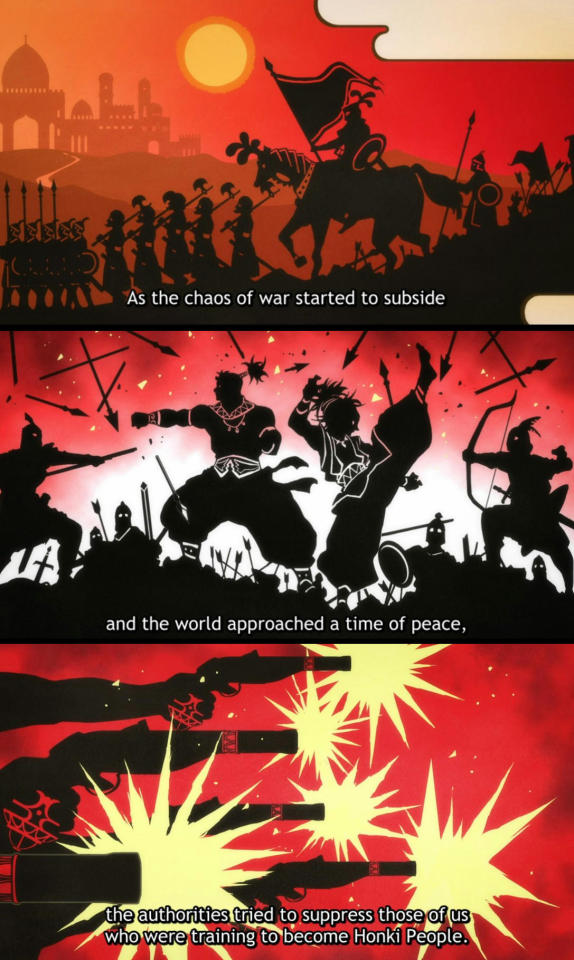
"Historically", those thought of as Honki were fighters who participated in conflicts 300 years ago - a bit after the end of the Sengoku Period, the continuously warring states that had defined Japan for two centuries. With the advent of the rigidly structured Edo Period, honorable fighters with no clear systemic alliance were no longer needed and the aspiring Honki People(TM) were mercilessly gunned down. This feels out of left field for an anime like Bucchigiri?! to focus on, so I propose a second more allegorical layer to impose over the literal pseudo-historical read.
Even beyond the historical fact that gun imports changed warfare, the usage of guns here is deliberate to represent something. Guns are associated with authorities, and contrasted against the Honki People(TM) shunning weapons and fighting only with their own bodies.
To be Honki(TM) means to be true to yourself and secure in your own identity - this is something that is a hindrance to a social system that relies on rules and groupthink to sustain itself. Supporting this assumption, the theme of 'death' by weapon/authority is mirrored in the show several times:

On the one hand, we have the NG Boys, a gang set apart from the other gangs in the story by their even more rigid hierarchical structure and their willingness to use weaponry. They all follow one leader, have one uniform look, and appear basically brainwashed into blind obedience.

The association of weapons=structure and authority is made pretty clearly through that alone, but is also enhanced by all the members of the NG Boys living under constant threat of being fed to the real authorities of society: the police. Fear keeps everyone in line.
And further, the idea of society as an oppressive force (especially to the lower class) is put into direct focus through Mitsukuni and Matakara. Poverty is brought up briefly before through Senya (our main Honki Person(TM) was a nameless orphan after all) and brought back with the Asamine brothers:
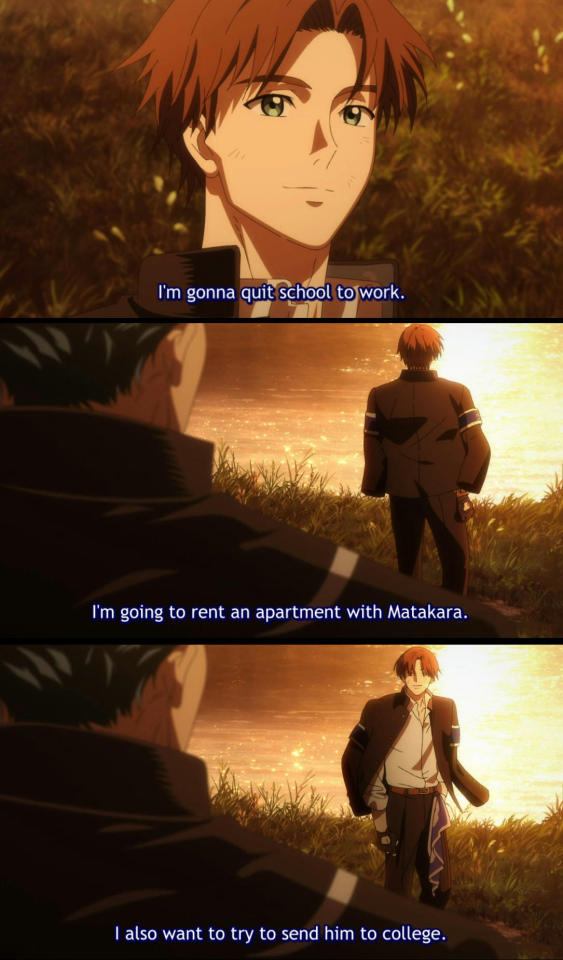
Mitsukuni wishes to escape his social status in order to offer a better life to his brother - and he's forcibly held down by the oppressive system around him.

The cop that causes Mitsukuni to go to jail is equivalent to the guns that shot Senya and Ichiya.
(Utsumi has explored this underlying socially critical current before. Not for nothing, her previous series SK8 opens with the memorable bridge of the title song reading: "before society can kill us".)
But Bucchigiri?! isn't about overthrowing the system. It's about the individual. Understanding the context about authority just helps setting the real theme into focus.
And that theme is to hold on steadfast to who you are and allow yourself to connect with others, even in various kinds of adversity.
After this long, long preamble, let's get to the actual main characters!!

Matakara and Arajin are people who are ruled by fear and who spend 11 episodes running from others and themselves in two very different ways.

Arajin is pretty hated as a protagonist, which amuses me a little, because nobody hates Arajin more than Arajin hates Arajin.
His past cowardice in failing to protect Matakara has clearly shown him that he is a pathetic person and he's spent his whole life since then trying to avoid being reminded of this. He avoids Matakara, the strongest reminder of his failure, but further than that he avoids connection with anybody that he could see as a peer.
Arajin is solely focused on finding love and romance because he feels inherently inferior to every person he would be invited to contrast himself against. He avoids other guys because he hates himself. He shuns connection and pursues only people (girls) he views as different enough to not invite any comparison.

Matakara meanwhile has major abandonment issues - he's lost his parents, Arajin, and his brother. Everyone important to him keeps vanishing from his life and in order to keep himself from feeling powerless about this he decides to blame himself.
If it's his own fault that people leave him (because he's weak) then there is something in his power that he can do in order to avoid being hurt again (becoming stronger). In order to maintain this state of motivational self-hatred, he puts others on a pedestal.
Matakara needs Arajin to be strong, powerful, honest and admirable... because that is the image he holds himself up by. In Mitsukuni and Arajin, Matakara creates god-like icons to chase after. And by doing so, he also shuns genuine connection.
Being confronted with Arajin as a flawed person gives Matakara a breakdown because it makes it harder to run from his own loneliness by focusing on chasing after Arajin.
Arajin is always running, but Matakara is always chasing... because he can't stand to look behind and face his monster.
In a lot of ways, Arajin and Matakara can't connect because they care about each other. Arajin can't stand what he allowed to happen to Matakara because he cared about Matakara. Matakara clings to Arajin because he loves him.
This theme of love hindering connection is again mirrored in two other characters - Senya and Ichiya, of course.

Ichiya, unwilling to confront his own terminal illness head-on, wishes to avoid it by goading Senya into killing him. By doing this, he can run from his own weakness and put Senya on a pedestal instead.
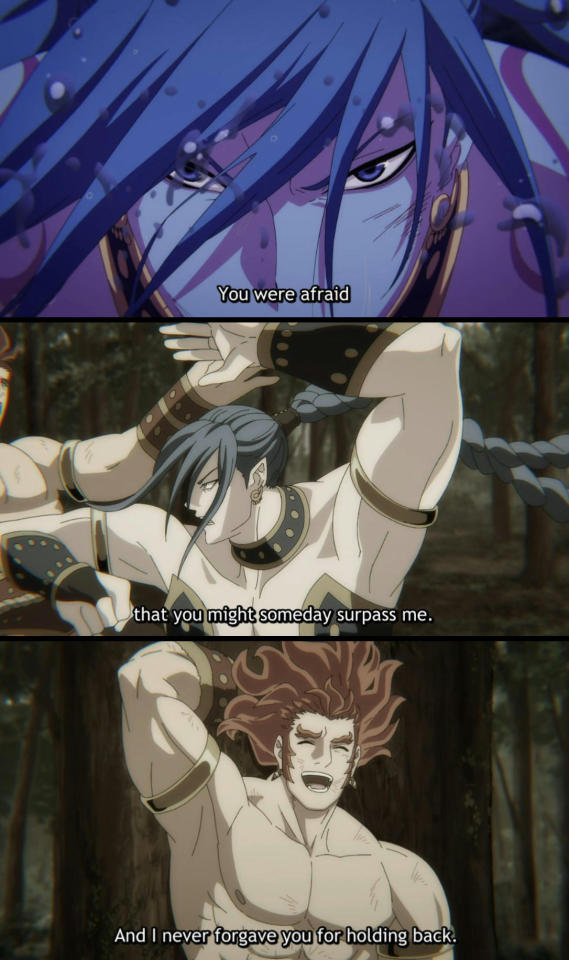
Meanwhile Senya is attached to their connection as-is and wishes to maintain this master-disciple dynamic forever - going so far as to deny his own strength in order to avoid acknowledging their changing dynamic.
Both of them are denying something about themselves.
It is their self-denial that makes their communication and thus connection break down.

Ichiya can't make Senya go Honki(TM) (which should have definitely been translated as an adverb here, e.g. 'failing to make him get serious') because he is also not HONEST with him or himself.
In the finale, Senya finally admits his motivations (his illness, his perceived weakness) and he is rewarded with the honest fight he'd been craving. They both stopped running.
This theme becomes even clearer through the two leads, of course, but even earlier than that it exists in Mahoro.

Mahoro's scene in episode 6 is the thematic linchpin that carried the whole show on its shoulders. Through Mahoro, everyone in the cast gets their first glimpse at true unrelenting Honki(tm) - and it is something totally unrelated to fighting prowess.
Mahoro is physically powerless against Akutaro, but she won't run. She has a heart that won't run away, the key quality of the Honki Person(TM), because she has an unshakable sense of self-identity.
It would be easy to dismiss her cutesy design as a contrivance to give Arajin a conventional-looking love interest despite going to Delinquent Academy - but it also says something about HER. Mahoro marches to the beat of her own drum. She does not care that she does not fit in, she does not mind being alone - she'll stick right to her own aesthetic and priorities.
So it's easy for her to call out Akutaro - and in doing so, call out the whole cast along with him:
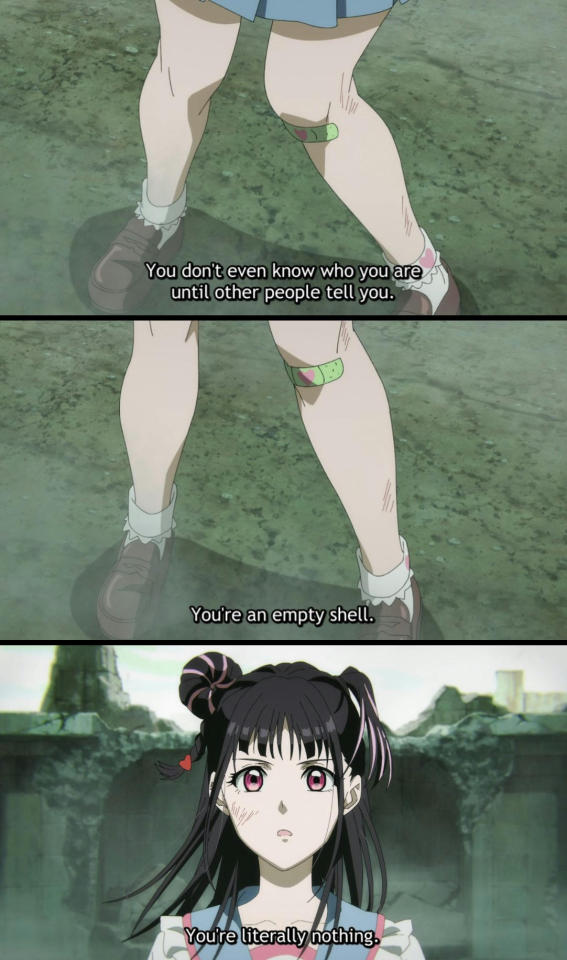
You're empty. You are nothing but a shell, shaped by how you relate to those around you. You have nothing to offer.
And how are you supposed to connect with anybody, when you don't even know who you are?
(Notably, Mahoro is also a character who refuses to compromise on her self even for love - she knows she does not appeal to Marito, but she's not changing herself to be more his type. Her Honki does not budge, even for him.)
And lest you think I am exaggerating by connecting the theme of identity and emptiness back to all of the cast instead of just Akutaro: it does come back with Matakara.
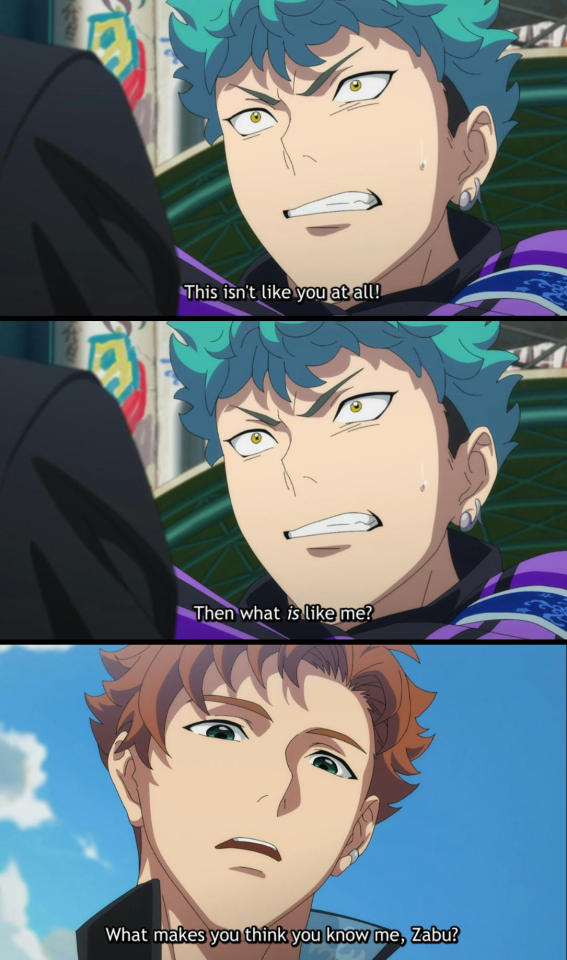
Matakara can't believe anybody would know him and care for him, because he doesn't know himself.
For Matakara, facing himself means acknowledging his fear of abandonment rather than externalizing it as a hallucination of a literal monster.
But facing yourself doesn't just mean facing your demons, it also means facing your own positive qualities. And that is Arajin's story.

Even as Arajin turned into a scummy, evasive and selfish guy, there is a part of him that has a throughline to who he always was. He's someone who can get invested in others with reckless abandon.
Whether as a child with Matakara, or in the present with Mahoro... Arajin wants to connect.
Bucchigiri?! is a show full of innuendo and sexual gags. Merging with a genie gets equated to sex, fighting gets equated to sex... and of course this is for laughs, but it's also thematic.

Because all these things are about connection. About facing someone else with your whole self.

On a literal level, yes, Arajin absolutely wants to get laid. This is his sincere desire, and good for him.
But at the same time, his battle cry of 'I want to lose my virginity!' is him crying out for a real connection, even at a time when he shunned the idea thereof.

In the end, being a Honki Person(TM) has nothing to do with fighting. Fighting is the way a lot of the rough and tumble guys on the show like to connect, but it is not the only way to do so and not the only way to be Honki(TM).

Arajin never learns to love brawling - he did it out of circumstance and necessity, but it's not his hobby. He does not need to discover some hidden love of fighting, because this show fundamentally isn't about how 'fighting is inherently good' or anything.
It's a show about how even when you hate yourself and think you're as low as it can get, acknowledging your own self in full is the first step to finding a real bond with somebody else.
It just also happens to feature a bunch of delinquents who love to punch a lot.

i think when talking about bucchigiri, i dont want to shy away from using the word "love" over "friendship". like friendship is undoubtedly an important type of love, but the more open and encompassing nature of the word "love" itself feels more appropriate for what's going on
bucchigiri ep 9 thoughts:
taken over huh... is that also what senya is doing to arajin maybe? like with the magic trampstamp (words i never expected to write...)
shindo is a bitch and pathetic but i enjoy his character unfortunately (in my defense, my interpretation of him threatening to do That to mahoro was just to make arajin pissed and get him to reveal senya. i think it was kind of narrative low-hanging fruit honestly.)
'is that a yes or no' take a wild fucking guess buddy
zabuuuuuu you are such a good friend
senya hitting people as a show of affection lol
matakara gathering money, presumably he was saving to get an apartment with his brother. what's he planning to use it for?
oh my godddd the cat boy drama 💀 this side gag is so stupid but so funny i love it. i imagine jasmine as as a pure white long hair cat and pu'er as a classic brown tabby. also cat boy getting way too invested in his personal life is *chefs kiss*
arajin is trying his absolute best to convince himself he doesn't care about matakara
the dynamic between komao, zabu, and ara is really funny. i think in other shows they might just sideline the friend characters but they really have an awkward 'friend of a friend' dynamic i like. komao isn't really socially aware enough to be mean to ara despite being him being mean to matakara, and zabu is more hostile but puts most of that aside for matakara's sake. it's like your friends scoping out your awful crush lmao
THE LIFE SIZED NAKED MARITO DOLL? EXCUSE ME??? there is so much wrong with mahoro oml
wait is the life sized naked marito doll marito's? that's somehow weirder.
mahoro, is that concern for a person who isn't your brother? wow
matakara :(
so is the 'monster' literal or metaphorical? interesting
ichiya you're hot as hell but stop telling matakara to draw away from his friends you bitch
'one person would've wanted it' stopppppp 😭 arajin is realizing he liked having matakara around while matakara is being turned against his friends by ichiya. the dramatic irony is killing me
the fact that this 'love forever stone' is a lake blue stone wrapped specifically in a blue cloth as well... that thing is definitely going to be given to matakara by the end, right? pretty gay if you ask me.
ohhhh my god mahoro character growth. plus her relating to him specifically through their shared brother idolization is a good touch. very sweet
mahoro's basically saying like "dude how are you only focused on yourself and me right now. how have you not noticed your childhood friend is depressed and crazy in love with you. like seriously he has not been subtle. at all." lmao i love herrrrrrr
mahoro deserves her own show
also relieved to have ara's interpretation of matakara and mahoro's relationship as romantic to be kind of trivialized again in this scene. i think their dynamic is more interesting as two very different personalities which share just enough to relate with each other. she only wants ara to get his shit together for matakara's sake. i want them to be besties please
arajin is The Worst with emotions huh. he can't read other's feelings and he's somehow worse at reading his own. he needs to stop being relatable right this second
yknow at this point i think i can say i truly and properly enjoy arajin as a character. he's mostly an asshole and deeply emotionally unintelligent but i like him regardless and because of it
ah senya ichiya and arajin matakara parallels as i expected
so does senya=matakara and ichiya=arajin kind of?
i really wasn't joking about them being exes huh
stoppppp ichiya gave him his name? senya was and continues to be so ridiculously down bad
'he meant absolutely everything to me.' dude.
senya is trying to get ara and matakara together bc he couldn't do that for him and ichiya
i am so gd curious what happened to drive them apart
matakara losing sight why he wanted to become a honki person in the first place (ara) and trying to destroy it
'what senya wants is your body' context needed.
i'm thinking maybe ichiya is willing to fully take over bodies and senya isn't, thus why he hasn't done it to arajin already. that or he was planning to in the beginning but got too attached
ohhh this is gonna make for a good dramatic fight
ughhhh another really good episode. i think the story's finally full found its stride. very hyped for the last 3 episodes. i think next episode will probably deal with betrayal between senya and ara, leading senya to explain exactly what happened between him and ichiya. matakara will trying to fight ara and ara will have to run away, frustrating matakara even more. mahoro might focus on trying to help matakara
okay look ik arajin's supposed to be like that character in that one prozd sketch that gets better over time but my fucking god if he doesn't stop peeing and pooping his pants and fumbling the baddest bitch in the school im climbing through the screen and showing him REAL bucchigiri
-
 sophyr05 liked this · 1 year ago
sophyr05 liked this · 1 year ago -
 1-amour-plastique liked this · 1 year ago
1-amour-plastique liked this · 1 year ago -
 dracupie liked this · 1 year ago
dracupie liked this · 1 year ago -
 hungry-radiance liked this · 1 year ago
hungry-radiance liked this · 1 year ago -
 toomanyfandomsthings liked this · 1 year ago
toomanyfandomsthings liked this · 1 year ago -
 andyfan7 liked this · 1 year ago
andyfan7 liked this · 1 year ago -
 jjk00jjk liked this · 1 year ago
jjk00jjk liked this · 1 year ago -
 rosetta-stone9 liked this · 1 year ago
rosetta-stone9 liked this · 1 year ago -
 the-stove-is-divorced reblogged this · 1 year ago
the-stove-is-divorced reblogged this · 1 year ago -
 the-stove-is-divorced liked this · 1 year ago
the-stove-is-divorced liked this · 1 year ago -
 sewninred liked this · 1 year ago
sewninred liked this · 1 year ago -
 am-0000n liked this · 1 year ago
am-0000n liked this · 1 year ago -
 llalicaarana liked this · 1 year ago
llalicaarana liked this · 1 year ago -
 adorableratandmenace liked this · 1 year ago
adorableratandmenace liked this · 1 year ago -
 alohatrashbin liked this · 1 year ago
alohatrashbin liked this · 1 year ago -
 noisymuffin liked this · 1 year ago
noisymuffin liked this · 1 year ago -
 headdaze liked this · 1 year ago
headdaze liked this · 1 year ago -
 woozicutie liked this · 1 year ago
woozicutie liked this · 1 year ago -
 homewithnobodies liked this · 1 year ago
homewithnobodies liked this · 1 year ago -
 flora-vika liked this · 1 year ago
flora-vika liked this · 1 year ago -
 lolia21 liked this · 1 year ago
lolia21 liked this · 1 year ago -
 fluffyotters reblogged this · 1 year ago
fluffyotters reblogged this · 1 year ago -
 fluffyotters liked this · 1 year ago
fluffyotters liked this · 1 year ago -
 beeee-leaf liked this · 1 year ago
beeee-leaf liked this · 1 year ago -
 loki-of-war liked this · 1 year ago
loki-of-war liked this · 1 year ago -
 i-wanna-be-the-girl liked this · 1 year ago
i-wanna-be-the-girl liked this · 1 year ago -
 beanyboobee reblogged this · 1 year ago
beanyboobee reblogged this · 1 year ago -
 straylaughs reblogged this · 1 year ago
straylaughs reblogged this · 1 year ago -
 skrunkly-soaked-rat liked this · 1 year ago
skrunkly-soaked-rat liked this · 1 year ago -
 beanyboobee reblogged this · 1 year ago
beanyboobee reblogged this · 1 year ago -
 beanyboobee liked this · 1 year ago
beanyboobee liked this · 1 year ago -
 coffepandas liked this · 1 year ago
coffepandas liked this · 1 year ago -
 thoughtfulgood liked this · 1 year ago
thoughtfulgood liked this · 1 year ago -
 chiarrara reblogged this · 1 year ago
chiarrara reblogged this · 1 year ago -
 empyreanwilliwaw liked this · 1 year ago
empyreanwilliwaw liked this · 1 year ago -
 panicking-silently liked this · 1 year ago
panicking-silently liked this · 1 year ago -
 certifiedlesbianvampire reblogged this · 1 year ago
certifiedlesbianvampire reblogged this · 1 year ago -
 asterlae liked this · 1 year ago
asterlae liked this · 1 year ago -
 snk25blr liked this · 1 year ago
snk25blr liked this · 1 year ago -
 vero-niche liked this · 1 year ago
vero-niche liked this · 1 year ago -
 rubywolf0201 reblogged this · 1 year ago
rubywolf0201 reblogged this · 1 year ago -
 empressg84 liked this · 1 year ago
empressg84 liked this · 1 year ago -
 lyingmuse liked this · 1 year ago
lyingmuse liked this · 1 year ago -
 certifiedlesbianvampire liked this · 1 year ago
certifiedlesbianvampire liked this · 1 year ago -
 yourfellowotakugay liked this · 1 year ago
yourfellowotakugay liked this · 1 year ago -
 straylaughs reblogged this · 1 year ago
straylaughs reblogged this · 1 year ago

it/they- real nyanbinary madness- hey! i'm mew. i ramble a lot about my interests. welcome to headcanon hell- doodle dump galore- multifandom
412 posts


